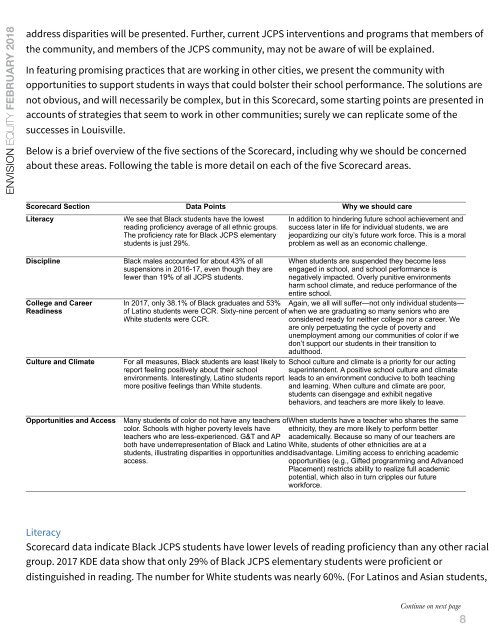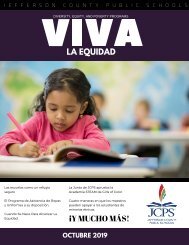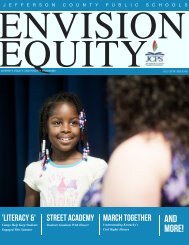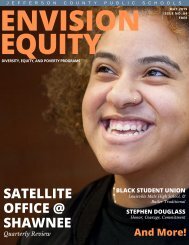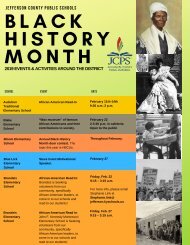February 2018 Edition of Envision Equity
Create successful ePaper yourself
Turn your PDF publications into a flip-book with our unique Google optimized e-Paper software.
ENVISION EQUITY FEBRUARY <strong>2018</strong><br />
address disparities will be presented. Further, current JCPS interventions and programs that members <strong>of</strong><br />
the community, and members <strong>of</strong> the JCPS community, may not be aware <strong>of</strong> will be explained.<br />
In featuring promising practices that are working in other cities, we present the community with<br />
opportunities to support students in ways that could bolster their school performance. The solutions are<br />
not obvious, and will necessarily be complex, but in this Scorecard, some starting points are presented in<br />
accounts <strong>of</strong> strategies that seem to work in other communities; surely we can replicate some <strong>of</strong> the<br />
successes in Louisville.<br />
Below is a brief overview <strong>of</strong> the five sections <strong>of</strong> the Scorecard, including why we should be concerned<br />
about these areas. Following the table is more detail on each <strong>of</strong> the five Scorecard areas.<br />
Scorecard Section Data Points Why we should care<br />
Literacy<br />
We see that Black students have the lowest<br />
reading pr<strong>of</strong>iciency average <strong>of</strong> all ethnic groups.<br />
The pr<strong>of</strong>iciency rate for Black JCPS elementary<br />
students is just 29%.<br />
In addition to hindering future school achievement and<br />
success later in life for individual students, we are<br />
jeopardizing our city’s future work force. This is a moral<br />
problem as well as an economic challenge.<br />
Discipline<br />
College and Career<br />
Readiness<br />
Culture and Climate<br />
Opportunities and Access<br />
Black males accounted for about 43% <strong>of</strong> all<br />
suspensions in 2016-17, even though they are<br />
fewer than 19% <strong>of</strong> all JCPS students.<br />
When students are suspended they become less<br />
engaged in school, and school performance is<br />
negatively impacted. Overly punitive environments<br />
harm school climate, and reduce performance <strong>of</strong> the<br />
entire school.<br />
In 2017, only 38.1% <strong>of</strong> Black graduates and 53% Again, we all will suffer—not only individual students—<br />
<strong>of</strong> Latino students were CCR. Sixty-nine percent <strong>of</strong> when we are graduating so many seniors who are<br />
White students were CCR.<br />
considered ready for neither college nor a career. We<br />
are only perpetuating the cycle <strong>of</strong> poverty and<br />
unemployment among our communities <strong>of</strong> color if we<br />
don’t support our students in their transition to<br />
adulthood.<br />
For all measures, Black students are least likely to<br />
report feeling positively about their school<br />
environments. Interestingly, Latino students report<br />
more positive feelings than White students.<br />
School culture and climate is a priority for our acting<br />
superintendent. A positive school culture and climate<br />
leads to an environment conducive to both teaching<br />
and learning. When culture and climate are poor,<br />
students can disengage and exhibit negative<br />
behaviors, and teachers are more likely to leave.<br />
Many students <strong>of</strong> color do not have any teachers <strong>of</strong> When students have a teacher who shares the same<br />
color. Schools with higher poverty levels have ethnicity, they are more likely to perform better<br />
teachers who are less-experienced. G&T and AP academically. Because so many <strong>of</strong> our teachers are<br />
both have underrepresentation <strong>of</strong> Black and Latino White, students <strong>of</strong> other ethnicities are at a<br />
students, illustrating disparities in opportunities and<br />
access.<br />
disadvantage. Limiting access to enriching academic<br />
opportunities (e.g., Gifted programming and Advanced<br />
Placement) restricts ability to realize full academic<br />
potential, which also in turn cripples our future<br />
workforce.<br />
Literacy<br />
Scorecard data indicate Black JCPS students have lower levels <strong>of</strong> reading pr<strong>of</strong>iciency than any other racial<br />
group. 2017 KDE data show that only 29% <strong>of</strong> Black JCPS elementary students were pr<strong>of</strong>icient or<br />
distinguished in reading. The number for White students was nearly 60%. (For Latinos and Asian students,<br />
Continue on next page<br />
8


